Wir schauen nach Bergkarabach, das in Aserbaidschan gelegene Gebiet, das faktisch bis vor kurzem von der Republik Bergkarabach (seit 2017: Arzach) kontrolliert wurde. Zum 1. Januar 2024 sollte die Republik aufgelöst werden.
Das nehmen wir zum Anlass, um uns die völkerrechtlichen Hintergründe des Konflikts anzuschauen. Im Interview ordnet Leonie Brassat vom Max-Planck-Institut in Heidelberg die verschiedenen Kampfhandlungen zwischen der Republik Bergkarabach, Aserbaidschan und Armenien völkerrechtlich ein. Zuvor blickt Isabel auf den Zerfall der Sowjetunion zurück und wie dort verschiedene Auffassungen von Staatlichkeit zum Tragen kamen.
Wir freuen uns über Lob, Anmerkungen und Kritik an podcast@voelkerrechtsblog.org. Abonniert unseren Podcast via RSS, über Spotify oder überall dort, wo es Podcasts gibt. Es gibt die Möglichkeit, auf diesen Plattformen den Völkerrechtspodcast zu bewerten, wir freuen uns sehr über 5 Sterne!
Hintergrundinformationen:
Moderation: Philipp Eschenhagen & Erik Tuchtfeld (LL.M (Glasgow))
Grundlagen: Dr. Isabel Lischewski
Interview: Leonie Brassat & Philipp Eschenhagen
Schnitt: Daniela Rau
Credits:

Philipp Eschenhagen is a research associate at Bucerius Law School and a PhD candidate at the Walther Schücking Institute for International Law. He is an editor at Völkerrechtsblog.

Erik Tuchtfeld is a research fellow at the Max Planck Institute for Comparative Public Law and International Law (Heidelberg) and head of the humanet3 research group. He is an editor at Völkerrechtsblog.


Dr. Isabel Lischewski is an Editor and Podcast Co-Host at Völkerrechtsblog as well as a post-doctoral researcher focusing inter alia on gender, governance, and education in international and German public law at University of Münster.